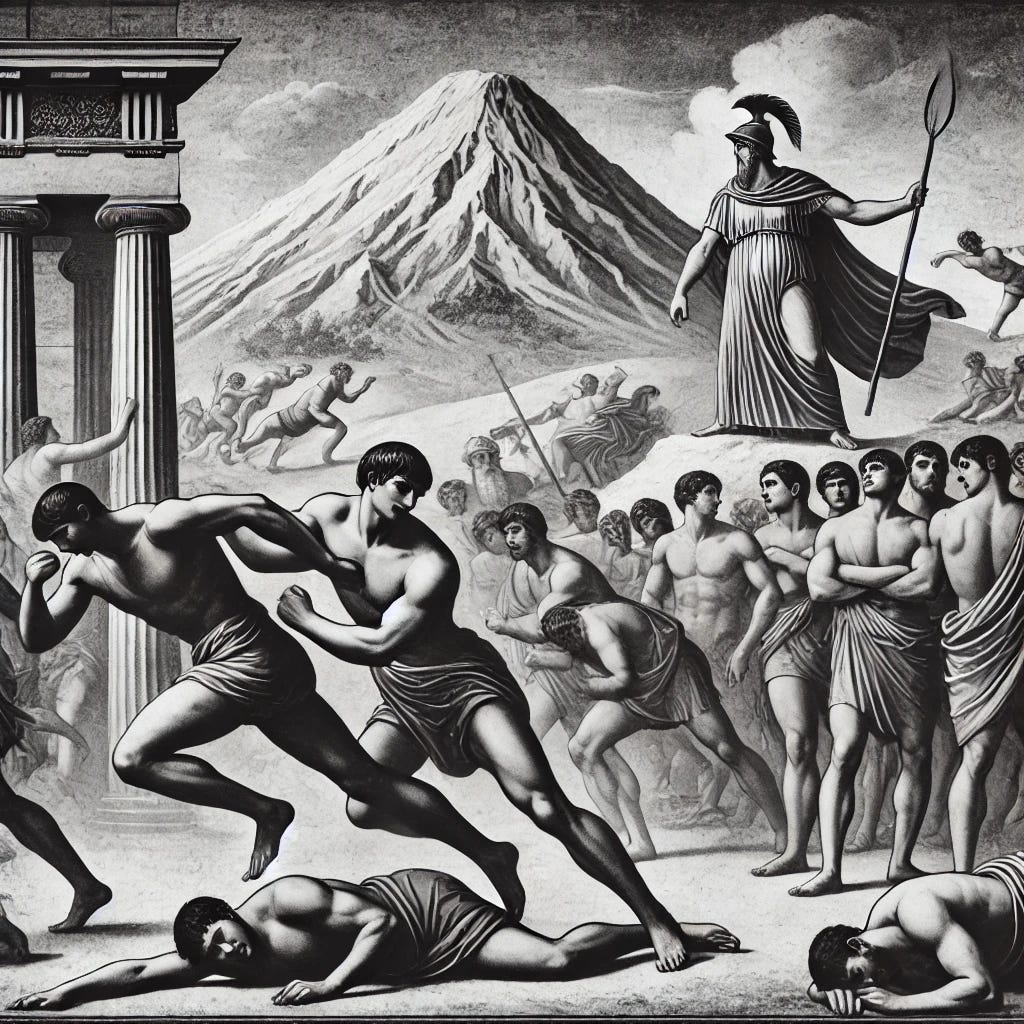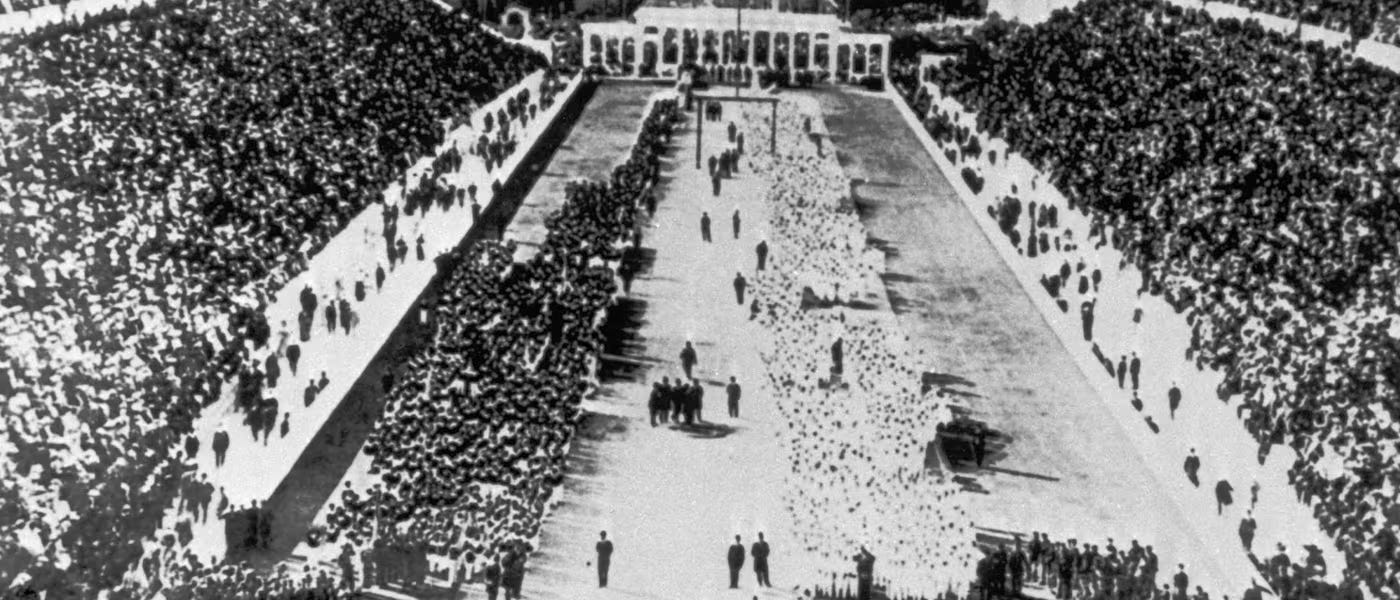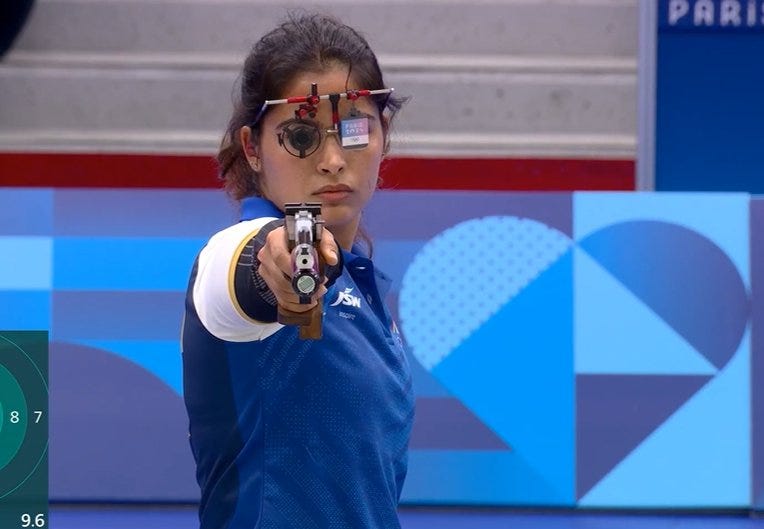The Revival of the Modern Olympic Games: Baron Pierre de Coubertin's Lasting Legacy
Citius, Altius, Fortius: "The most important thing is not winning but taking part; the essential thing in life is not conquering but fighting well."
The Genesis of the Ancient Olympic Games
The ancient Olympic Games have their origins in Olympia, Greece, with the earliest recorded Games taking place in 776 BC. These games were held in honour of Zeus and were a crucial part of a religious festival. They occurred every four years, known as an Olympiad, and included various athletic competitions such as running, wrestling, boxing, and chariot racing. Only freeborn Greek men were allowed to participate. The ancient Games continued for nearly 12 centuries until they were banned by Roman Emperor Theodosius I in 393 AD as part of his efforts to promote Christianity.
Pierre de Coubertin and the Revival of the Olympic Games
Early Life and Inspiration
Baron Pierre de Coubertin, a French educator and historian, played a pivotal role in reviving the Olympic Games. Born into French aristocracy on January 1, 1863, Coubertin was deeply influenced by his visits to British public schools and American colleges, where he observed the emphasis on physical education. He believed that sport was essential for developing character and improving educational systems.
The Journey to Revival
In 1889, Coubertin conceived the idea of reviving the ancient Olympic tradition. By 1894, he had organized a congress at the Sorbonne in Paris, which led to the establishment of the International Olympic Committee (IOC). This congress decided that the first modern Olympic Games would be held in Athens, Greece.
The 1896 Athens Olympics
The first modern Olympic Games took place in Athens from April 6 to April 15, 1896. This historic event saw 241 athletes (all male) from 14 nations competing in 43 events across nine sports. The Panathenaic Stadium, the main venue for the Games, was filled with an estimated 80,000 spectators, marking the largest international participation in a sporting event at the time. The success of the Athens Games was a significant milestone in international sports history, setting the foundation for future Olympic events.
Challenges to the Modern Olympic Games
Early Struggles
The modern Olympic movement faced numerous challenges in its early years. The 1900 Paris Olympics and the 1904 St. Louis Olympics were overshadowed by concurrent World's Fairs, leading to poor organization and low athlete participation. World War I caused the cancellation of the 1916 Games. Despite these setbacks, the Olympics gained momentum with the successful 1912 Stockholm Games and the 1924 Paris Games.
Overcoming Adversities
Throughout the 20th century, the Olympic Games navigated through political boycotts, economic crises, and logistical challenges. The resilience of the IOC and the growing global interest in the Games helped in overcoming these hurdles, ensuring the continuity and evolution of the Olympic movement.
Olympic Spirit, Symbols and Motto
The Olympic Rings
The iconic Olympic rings were designed by Pierre de Coubertin in 1913. The five interlaced rings, coloured blue, yellow, black, green, and red on a white background, represent the union of the five continents and the meeting of athletes from around the world. Contrary to popular belief, these colours do not correspond to specific continents but were chosen because at least one of them appeared on the national flag of every country participating in the Olympics at that time. The rings made their Olympic debut at the 1920 Antwerp Games.
The Olympic Motto
The Olympic motto, "Citius, Altius, Fortius" (Faster, Higher, Stronger), was introduced in 1924 at the Paris Olympics. Coubertin adopted this Latin phrase from his friend Henri Didon, a Dominican priest and sports enthusiast. In 2021, the IOC approved the addition of "Communiter" (Together) to the motto, making it "Citius, Altius, Fortius – Communiter", reflecting the importance of solidarity and unity.
The Enduring Principle of Participation and Its Impact
The Olympic declaration emphasizing participation over winning is a core principle of the Olympic movement, encapsulating the spirit of Olympism. Attributed to Pierre de Coubertin, founder of the modern Olympic Games, it states: "The important thing in the Olympic Games is not to win, but to take part; the important thing in life is not the triumph, but the struggle; the essential thing is not to have conquered but to have fought well." Coubertin first expressed this sentiment in 1908 in response to the growing emphasis on winning and nationalism. This declaration highlights the importance of participation, effort, and personal growth over mere victory. Despite being over a century old, the declaration remains central to the Olympic movement, promoting values such as perseverance, fair play, and personal excellence. Its enduring power lies in reminding athletes and spectators that the Olympics are about more than winning medals; they celebrate personal excellence, international understanding, and the human spirit of endeavour and perseverance.
India's Role in the Olympics
Early Participation and Achievements
India's first participation in the Olympic Games was in 1900 in Paris, represented by Norman Pritchard, who won two silver medals in athletics. Even before attaining independence, India sent a team to the 1920 Antwerp Games. The country's first individual Olympic medal post-independence was won by K.D. Jadhav, who secured a bronze in wrestling at the 1952 Helsinki Olympics.
Notable Medal Winners
Hockey Dominance (1928-1980): India won 8 gold medals, 1 silver, and 2 bronze medals in men's field hockey, with legendary players like Dhyan Chand leading the charge.
Leander Paes (1996 Atlanta): Bronze in tennis singles.
Karnam Malleswari (2000 Sydney): Bronze in weightlifting, the first Indian woman to win an Olympic medal.
Abhinav Bindra (2008 Beijing): Gold in 10m air rifle shooting, India's first individual gold medal.
Sushil Kumar: Bronze (2008 Beijing) and silver (2012 London) in wrestling.
Vijender Singh (2008 Beijing): Bronze in boxing.
Mary Kom (2012 London): Bronze in boxing.
P.V. Sindhu: Silver (2016 Rio) and bronze (2020 Tokyo) in badminton.
Sakshi Malik (2016 Rio): Bronze in wrestling.
Neeraj Chopra (2020 Tokyo): Gold in javelin throw, India's first gold in athletics.
Recent Success and Future Prospects
At the 2020 Tokyo Olympics, India achieved its best performance to date, winning 7 medals across various sports. This success underscores India's growing prowess and potential in the global sports arena.
Paris 2024: Manu Bhaker Shoots Bronze
Manu Bhaker has made history by winning India's first medal at the Paris 2024 Olympics, securing a bronze in the women's 10m air pistol event. This achievement is particularly significant as Bhaker became the first Indian woman shooter to win an Olympic medal, marking India's first medal at the Paris 2024 Olympics. The event took place at the Chateauroux Shooting Centre, where Bhaker scored 221.7 points in the final, narrowly missing the silver medal by just 0.1 points. She qualified for the final in third position with a score of 580, demonstrating excellent form throughout the qualification rounds. In the final, Bhaker maintained a strong position, spending most of the event in the top three, and was briefly in second place before securing the bronze with her final shot.
This victory marks a significant comeback for Bhaker after her disappointing performance at the Tokyo Olympics in 2021, where she faced issues with a pistol malfunction. Her bronze medal ends a 12-year drought for Indian shooting at the Olympics, with the last medals in shooting coming at the London 2012 Olympics. Bhaker expressed her gratitude and relief, stating, "After Tokyo, I was very disappointed. It took me a long time to get over that. So really grateful that I could win bronze, maybe (it will be) better next time." At just 22 years old, Bhaker's achievement not only marks a personal triumph but also represents a significant milestone for Indian shooting and women's sports in the country, opening up possibilities for more success in future Olympic events.
Looking Forward
The Olympic Games have evolved significantly since their modern revival, growing in scale, global participation, and cultural significance. The IOC continues to adapt the Games to contemporary challenges, including sustainability concerns, technological advancements, and changing societal values. The enduring symbols of the rings and the motto continue to represent the Olympic ideals of international cooperation, athletic excellence, and human achievement.
The Enduring Spirit of the Modern Olympic Games
The modern Olympic Games, underpinned by the vision of Pierre de Coubertin, stand as a testament to the unifying power of sports, transcending borders and fostering a spirit of global camaraderie and excellence. Despite the increasing emphasis by modern motivational coaches on the notion that “those who said winning isn’t important probably lost,” the enduring theme of fighting well continues to resonate. This is exemplified by the legendary Milkha Singh, who finished fourth in the 400 metres at the Rome Olympics of 1960. In that race, with the first two runners breaking the existing Olympics record, showcasing the high level of competition and the spirit of striving for personal excellence. Milkha Singh's performance remains an iconic example of the Olympic ideal of participation and effort over mere victory.







